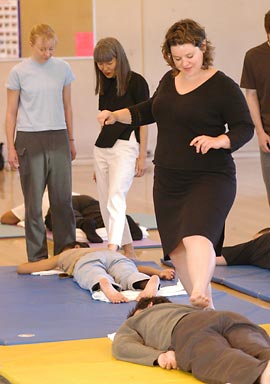UC Berkeley Press Release
Emotional balance for working journalists is goal
BERKELEY – Whether covering a school massacre, multi-car pileup, or the trial of an accused pedophile, reporters are expected to file their stories on deadline and quickly gear up for the next one.
But when working on "stories of trauma, loss, suffering, they do not walk away clean," says William Drummond, a University of California, Berkeley, journalism professor and veteran newsman. "As an industry, the news media offer little, if any, preparation or comfort to its workers who face this kind of emotional meat grinder."
 Kate Jessup practices her barefoot massage techniques on fellow student Adam Shemper. The weekly sessions at Hearst Gym, taught by Alison Ebata (in white pants), an expert in Reiki, acupressure and barefoot shiatsu, are part of a new class on emotional balance for working journalists. (Peg Skorpinski photo) |
"This course, simply put, will raise the issue of how, exactly, can one do this job and remain sane?" says Drummond.
The spring semester course features semi-weekly seminar sessions with discussions of readings as well as preventative and healing therapies, and presentations by guest lecturers. Each Friday morning, his 13 students don loose-fitting clothes and meet at the campus's Hearst Gymnasium for yoga or other exercise, guided imagery, and bodywork such as acupressure and foot massage.
Drummond hopes students will learn about the therapeutic power of touch, how to use guided imagery to focus their news coverage, and how to call upon therapeutic techniques to revive flagging spirits.
Each student also must take at least six sessions of an energy-based exercise such as Tai Chi, Chi Gung or yoga, and receive at least one bodywork session from a certified therapist. "At the very least, the students will learn to do a proper back rub," quips Drummond.
He knows that some eyes will roll at the class description, and that some may see it as oh-so-California. "I do get heckled," he says. "A lot of people make jokes about it."
"Drummond's own career included stints as a newspaper writer and editor, associate press secretary to President Jimmy Carter, and reporter for National Public Radio on such topics as national security. He says he understands what it's like when journalists "are expected to suck up and move on."
"I came from a generation (of journalists) that believed gin and donuts were the cure for everything," he says. He lists the debriefing, de-stressing haunts of journalists not that long ago. For those at the Los Angeles Times, it was The Redwood Room. For New York scribes, it was Pete's. And everyone at the San Francisco Chronicle knew The M&M.
At least reporters talked with one another, even if their boozy support networks convened on bar stools, Drummond says. But contemporary journalists sit in their cars stuck in traffic on the freeway as they head home from the latest news drama, he says. They often talk to no one about their workday stresses.
When someone shoots up a schoolyard, Drummond says, the administrators routinely call in grief counselors to tend to the surviving students, teachers and other staff. "But the reporters and camera people who covered that story get no such attention," he says. "They saddle up and go off to the next crime scene."
His interest in the way student journalists struggle to cope with the uncertainties of getting started and surviving in a competitive, high-pressure profession began when he first taught at his alma mater, UC Berkeley's Graduate School of Journalism, in 1983.
"Our jobs (teaching journalism) seem to be to fatten frogs for the snakes," says Drummond, noting the young reporters being hired just out of school by "multi-national, money-making machines."
Adding to Drummond's concern is continual newsroom gossip about journalists who have run aground professionally because of issues in their personal lives. As a headline screams on the Web site for the Dart Center for Journalism and Trauma at the University of Washington School of Communications: "Journalism is a Time Bomb."
Drummond acknowledges that he used to preach to his students to make their way to the top rungs of their profession "by any means necessary." Now, he says, some of his biggest student success stories never got jobs reporting. One teaches high school. Another teaches yoga. Yet, he admires their success balancing their personal and professional lives, while doing jobs they love.
What lead to his change of heart?
Last summer, his wife, longtime TV newswoman Faith Fancher, was stricken with breast cancer. To help comfort her, he enrolled in a 150-hour certification course at the Acupressure Institute in Berkeley. He earned his diploma in August, and didn't stop there.
He enrolled in another program involving an additional 200 hours of training, specializing in the field of emotional balance. Along the way, he encountered an outpouring of warmth and support that he couldn't help but respond to.
"There is a thing in us - our spirit - and that's something we need to pay attention to and learn how to take care of," Drummond says.
When he was the Los Angeles Times New Delhi bureau chief, Drummond interviewed Mother Teresa at her ashram in Calcutta. He ended his questioning by asking how the nun could be such a great humanitarian and yet oppose a woman's right to choose. Mother Teresa turned the table and asked him how he brought God into his work.
"That conversation has kind of bedeviled me for 30 years," Drummond says. "Now I think I get it."

